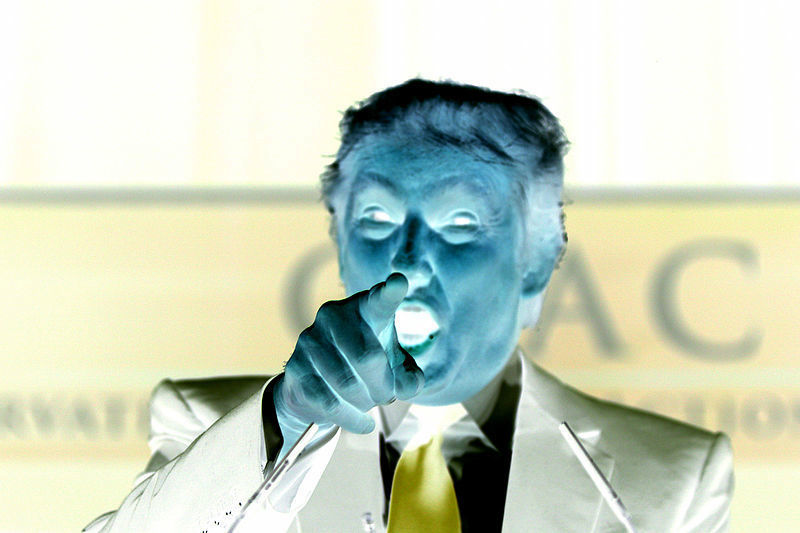At a special screening of a Woody Allen movie several years ago in L.A., producer Robert Greenhut joined a post-film talkback with reporter Charles Champlin. Allen wasn’t present, but I remember that nearly halfway through the conversation, the two men realized, a little sheepishly, that they’d been talking more or less nonstop about “him”—about how “he” works and “his” oeuvre, all without once dropping the name of the film’s iconic auteur. The film’s maker was so central in everyone’s mind, even in his absence, that he needed no attribution.
I think of this relatively innocent moment now whenever I’m in a conversation, live or virtual, in which the topic of our current political nervous breakdown inevitably centers around the actions and motivations of an omnipresent “he” who needs no introduction, and in some quarters deserves none. As if to mock the practice of some conscientious objectors who valiantly try to avoid, Voldemort-like, the speaking of his name, Donald J. Trump, in the year since he was improbably elected to the presidency, has achieved the still greater status of national fixation. Love him or hate him, he’s the thought we can’t seem to avoid, try though we might, like a brand name incessantly shouted in our ear, or Big Brother’s face on the wall. This is a victory more total, and more momentous, than winning the Electoral College.
One pressing question for all of us is whether we collaborate in that victory by handing this single man so much mindshare. Whether we’re rubbernecking or resisting, have we misplaced our focus? It’s a theme that bubbles under a package of stories in this month’s issue as we take stock of our theatre nation a full year after the 2016 election. In a centerpiece story, our founding editor, Jim O’Quinn, surveys a clutch of productions that either explicitly confront Trump’s America, or address the nation that gave us Trump and will be left to struggle on after he’s gone. A bracing essay by Ismail Khalidi and Naomi Wallace likewise challenges us to look behind and beyond the spectacle of our dear leader to consider the systemic forces of empire and capital he embodies.
Lest we go deaf in a left/liberal echo chamber, Simi Horwitz files a fascinating report on the efforts of conservative theatremakers, loosely defined, to make their voices heard onstage. Milwaukee Rep managing director Chad Bauman writes about making theatre in a purple state, and David Dudley checks in with such protest theatre stalwarts as Double Edge Theatre, Bread and Puppet Theater, and Jean-Claude van Itallie, as well as a number of newer players on the scene.
At the center of this package is a peppery spray of outrage from one of our preeminent living playwrights, Suzan-Lori Parks, who spent the first 100 days of Trump’s presidency writing a play a day, much as she spent 2002-03 writing 365 Plays/365 Days. In the exclusive excerpts we publish here, Parks’s playlets are by turns angry, funny, explosive, surreal, and strangely heartening. As she explains to associate editor Diep Tran, she wrote them not only for her mental health but, in a sense, for all of ours, the way artists—the first responders of the soul—always step up to witness, process, and feel the temper of the age. Theatres remain among the few places we can put away our phones, leave behind the churning news cycle, and face the larger questions raised by this bewildering moment. If Trump is the supreme distractor-in-chief, our artists are reclaiming our time.


